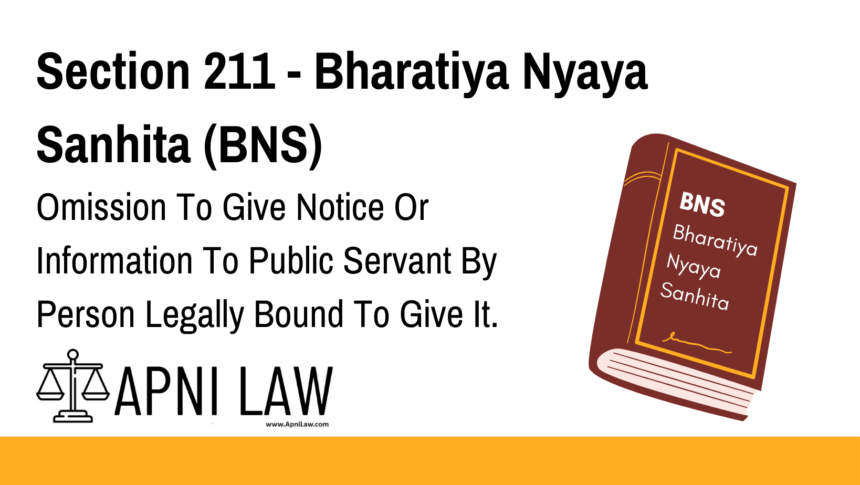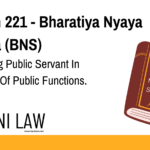Code: Section 211 BNS
Whoever, being legally bound to give any notice or to furnish information on any
subject to any public servant, as such, intentionally omits to give such notice or to furnish
such information in the manner and at the time required by law,––
(a) shall be punished with simple imprisonment for a term which may extend to
one month, or with fine which may extend to five thousand rupees, or with both;
(b) where the notice or information required to be given respects the commission
of an offence, or is required for the purpose of preventing the commission of an
offence, or in order to the apprehension of an offender, with simple imprisonment for a
term which may extend to six months, or with fine which may extend to ten thousand
rupees, or with both;
(c) where the notice or information required to be given is required by an order
passed under section 394 of the Bharatiya Nagarik Suraksha Sanhita, 2023 with
imprisonment of either description for a term which may extend to six months, or with
fine which may extend to one thousand rupees, or with both.
Explanation of Section 211 BNS
Section 211 of the Bharatiya Nyaya Sanhita (BNS) penalizes individuals who fail to provide legally required notice or information to a public servant. This provision ensures accountability and facilitates law enforcement by penalizing intentional omissions in reporting essential details.
Key Provisions of Section 211 BNS:
- Legal Obligation to Provide Information:
- The law mandates that individuals provide notice or information to public servants when legally required.
- Punishment for Omission:
- If a person fails to provide such notice or information, they may face simple imprisonment for up to one month or a fine of ₹5,000, or both.
- More Severe Punishment in Criminal Matters:
- If the withheld information pertains to the commission of an offense, preventing an offense, or aiding in the apprehension of an offender, the punishment increases to six months’ imprisonment or a fine of ₹10,000, or both.
- Failure to Follow Orders under Section 394 BNS:
- If the information was required under an order issued as per Section 394 BNS, the individual can face six months’ imprisonment or a fine of ₹1,000, or both.
Illustrations of Section 211 BNS
Example 1: Omission of Required Notice
A factory owner is legally required to report an industrial accident to the labor authorities. If he deliberately fails to report the incident, he can be punished under Section 211(a) BNS with imprisonment for up to one month or a fine of ₹5,000.
Example 2: Withholding Information About a Crime
A shopkeeper witnesses a robbery and is aware of the identity of the offenders but refuses to inform the police. Since the information is crucial for apprehending the criminals, the punishment under Section 211(b) BNS can extend to six months’ imprisonment or a fine of ₹10,000.
Example 3: Ignoring a Legal Order
A resident receives an order under Section 394 BNS to report any suspicious activities in his neighborhood. If he fails to report an ongoing burglary, he can be sentenced to six months’ imprisonment or fined ₹1,000 under Section 211(c) BNS.
Common Questions and Answers on Section 211 BNS
1. Who is legally bound to give information under this section?
Any person who is required by law to provide notice or information to a public servant is bound under Section 211 BNS. This includes individuals, business owners, government employees, and witnesses of crimes.
2. What happens if someone unintentionally forgets to provide the information?
Unintentional omissions are not covered under Section 211 BNS. The provision applies only when there is an intentional omission to provide notice or information.
3. What if the information was confidential or could harm the informant?
Certain legal protections may apply, such as the right against self-incrimination. However, in most cases, individuals are expected to provide critical information to law enforcement authorities.
4. Is there a defense available for the accused under Section 211 BNS?
Yes, if the accused can prove that they had a valid justification for not providing the required information or that they were unaware of their legal obligation, they may not be held liable under Section 211 BNS.
5. Can a person appeal against a conviction under this section?
Yes, a convicted individual can appeal against the sentence in a higher court if they believe the conviction was unjust or incorrect.
Conclusion
Section 211 of the Bharatiya Nyaya Sanhita (BNS) plays a crucial role in ensuring compliance with legal obligations and assisting law enforcement. It penalizes individuals who fail to provide essential notices or information, thereby enhancing public safety and accountability.
For more legal insights and expert guidance, visit ApniLaw today! 🚀








